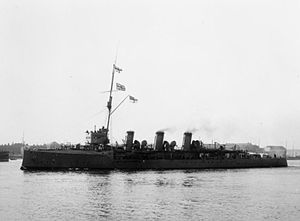HMS Skirmisher (1905)
 |
|
| History | |
|---|---|
|
|
|
| Name: | HMS Skirmisher |
| Builder: | Vickers Limited |
| Laid down: | July 1903 |
| Launched: | 7 February 1905 |
| Commissioned: | July 1905 |
| Fate: | Sold for scrapping on 3 March 1920 |
| General characteristics | |
| Class and type: | Sentinel-class scout cruiser |
| Displacement: | 2,880 tons |
| Length: | |
| Beam: | 40 ft (12 m) |
| Draught: | 14 ft (4.3 m) |
| Propulsion: |
|
| Speed: | 25 knots (46 km/h) |
| Range: | Carried 160 tons coal (410 tons max) |
| Complement: | 298 |
| Armament: |
|
| Armour: |
|
HMS Skirmisher was one of two Sentinel-class scout cruisers which served with the Royal Navy. She was completed in 1905 and served throughout the First World War, being scrapped in 1920. She has been the only ship of the Royal Navy to bear the name Skirmisher.
Skirmisher was laid down at Vickers, Sons & Maxim's Barrow-in-Furness shipyard on 29 July 1903 and was launched on 7 February 1905.
Skirmisher was 381 feet (116.13 m) long overall and 360 feet (109.73 m) between perpendiculars, with a beam of 40 feet (12.19 m) and a draught of 14 feet (4.27 m). Displacement was 2,880 long tons (2,930 t). The Sentinel-class differed from the other contemporary Royal Navy scout cruiser classes (the Adventure, Forward and Pathfinder classes) in having a turtleback forecastle and shorter funnels. She was powered by two four-cylinder triple-expansion steam engines fed by 12 Vickers-Express boilers, and driving two 3-bladed propellers. The machinery was rated at 17,000 indicated horsepower (13,000 kW) to meet the required speed of 25 knots (46 km/h; 29 mph).
Skirmisher's main armour protection consisted of an arched protective deck, covering the full length of the ship, which was 1 1⁄2–5⁄8 inch (38–16 mm) thick, while the ship's conning tower was protected by 3 inches (76 mm) of armour. The Scout cruisers were intended to lead and support destroyer flotillas, and their armament was meant to fight destroyers rather than heavier ships. Main gun armament consisted of ten 12-pounder (76 mm) QF guns, arranged three abreast fore-and-aft to give maximum end-on fire for chase engagements and two more guns on each beam. This was supplemented by eight 3-pounder (47 mm) guns. Two 18 inch (450 mm) torpedo tubes were fitted, with a single spare torpedo carried. This armament was considered too light, and an additional two 12-pounder guns were added on the ship's beams soon after commissioning, while the 3-pounder guns were replaced by six 6-pounder (57 mm) guns. She was rearmed again in 1911–12, when the 12-pounder guns were replaced by nine 4 inch guns.
...
Wikipedia
